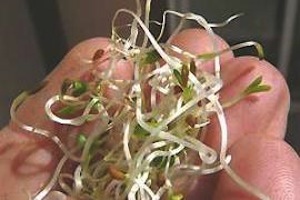This is the only advice I’ve given my daughters: keep your stick on the ice, don’t take wooden nickels, and when someone says, “trust me,” immediately distrust that person.
When a sprout grower involved in an outbreak that sickened 140 people says, “it’s next to impossible for anything to happen," giggle knowingly and walk away.
Tiny Greens’ Organic Farm in Urbana, Illinois, the source of a Jimmy John’s related sprout outbreak that sickened at least 140, talks a lot on its web page about being sustainable, natural, organic and using a crap-load of crap in their sprout production.
“The farm is certified by the Global Organic Alliance, which helps with finding a supply of organic seeds, which can be surprisingly hard to acquire. We grow the seeds in compost that we create ourselves, made of .jpg) a mixture of year old woodchips and leftover sprouts. We have never had to find an outside source for compost. As long as you keep the sprouts healthy, there is no need for using chemicals. Healthy growing materials also mean an end product that is higher in vitamins, minerals and enzymes.”
a mixture of year old woodchips and leftover sprouts. We have never had to find an outside source for compost. As long as you keep the sprouts healthy, there is no need for using chemicals. Healthy growing materials also mean an end product that is higher in vitamins, minerals and enzymes.”
Why a national sandwich chain like Jimmy John’s would buy an identified high-risk product – raw sprouts – from such an outfit is beyond me; it’s their business to lose.
Yesterday, the owner of Tiny Greens’ went on the PR offensive, telling The News-Gazatte he has taken several corrective actions to address food safety concerns raised by the U.S. Food and Drug Administration.
Why didn’t he do that previously, what with all the raw sprout outbreaks over the past two decades?
"After the changes we made, it’s next to impossible for anything to happen," said Bill Bagby Jr., owner of Tiny Greens in Urbana.
According to the FDA, a sample of compost runoff from outside the Urbana farm turned up a salmonella strain "indistinguishable" from the one responsible for the outbreak.
After agency inspectors noted that Tiny Greens employees, who were wearing boots, pushed carts through compost water runoff outside the facility and did not sanitize boots or carts before returning through a greenhouse door to the production area, Bagby said now the outside carts and boots never come inside the production facility, and inside boots and carts never go outside the facility. The greenhouse door also is now for exiting the building only.
Bagby consulted with an epidemiologist to help him throughout the process, and a new food safety manager is now on staff.
.jpg) unnamed Mat-Su farm.
unnamed Mat-Su farm.
 products and an estimated 77 illnesses reported in 26 states. The illnesses were linked through an epidemiologic investigation and PFGE analyses by state health departments and The Centers for Disease Control and Prevention (CDC).
products and an estimated 77 illnesses reported in 26 states. The illnesses were linked through an epidemiologic investigation and PFGE analyses by state health departments and The Centers for Disease Control and Prevention (CDC)..jpg)

 McAllen, TX and at the U.S. border destined for Agromod Produce, Inc.
McAllen, TX and at the U.S. border destined for Agromod Produce, Inc. 
.jpg) Tucker Adkins Dairy on June 14, 2011. The onset of illness in these cases occurred in mid June. One person was hospitalized.
Tucker Adkins Dairy on June 14, 2011. The onset of illness in these cases occurred in mid June. One person was hospitalized. water. The farms belong to Henan Huaying Agricultural Development Co Ltd.??
water. The farms belong to Henan Huaying Agricultural Development Co Ltd.?? Germany and one focused around the French city of Bordeaux.
Germany and one focused around the French city of Bordeaux.  gastrointestinal illness,” said Dr. Mary McIntyre, medical officer of the ADPH’s Bureau of Communicable Disease. The Splash Pool appears to be the common area of exposure at this time, according to that same ADPH release.
gastrointestinal illness,” said Dr. Mary McIntyre, medical officer of the ADPH’s Bureau of Communicable Disease. The Splash Pool appears to be the common area of exposure at this time, according to that same ADPH release..jpg) a mixture of year old woodchips and leftover sprouts. We have never had to find an outside source for compost. As long as you keep the sprouts healthy, there is no need for using chemicals. Healthy growing materials also mean an end product that is higher in vitamins, minerals and enzymes.”
a mixture of year old woodchips and leftover sprouts. We have never had to find an outside source for compost. As long as you keep the sprouts healthy, there is no need for using chemicals. Healthy growing materials also mean an end product that is higher in vitamins, minerals and enzymes.”.jpg) according to officials from the Department of Health Services (DHS) and Western Racine County Health Department (WRCHD). A parent had supplied unpasteurized milk from the farm for the school event.
according to officials from the Department of Health Services (DHS) and Western Racine County Health Department (WRCHD). A parent had supplied unpasteurized milk from the farm for the school event.